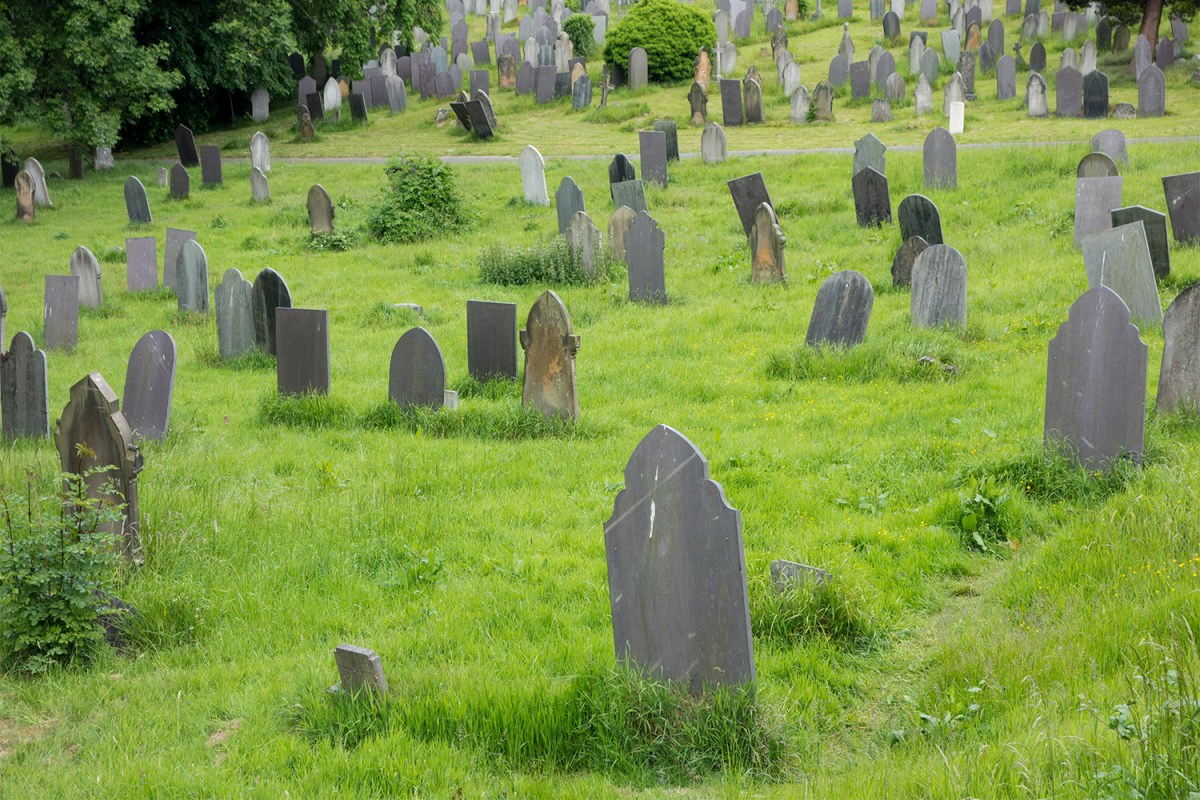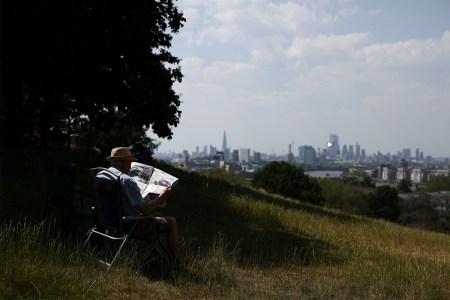I’ve never minded cemeteries. If anything, I’ve long felt a bizarre degree of camaraderie and comfort while moving through them. This is almost certainly because I grew up down the street from a 23-acre graveyard in New Jersey. Even at a young age, the place’s history always appealed to me more than its rotting coffins gave me pause. I liked reading the years on the graves and searching for the few families born before the Revolutionary War. I wondered what you had to do to earn yourself an obelisk or mausoleum.
Besides, my family and neighbors treated the place like a sort of quiet park. It was a sprawling compound with paved paths, the perfect place to check in on the changing of the seasons, or spot a hawk or fox. When I was young, my parents taught me how to ride a bike there. When I was older, I taught myself how to skate there.
During the throes of the pandemic, home and quarantining, I’d often see the same faces walking or cycling around that cemetery, most of them catching up with friends or family on the phone. Upon encountering a parked car, we’d all observe an unsaid yet understood rule: put the phone away, lower your volume or tread off in the opposite direction.
Far from puncturing my little bubble, these reminders of what the cemetery is actually for were welcome. If anything, they seemed to ascribe special importance to the simple sanctity of whatever I was up to.
In other words, I realized that you’re not just walking a loop, sharing a conversation with a loved one — you’re doing something specific that someone else can no longer do. Something that you will one day no longer be able to do.
Is this morbid? Sad? Inappropriate to discuss at dinner? A little, definitely and usually. But it’s also true. And in the recognition of that truth is a window of opportunity — to honor the dead, empathize with the living and cherish what you’ve got, for as long as you’ve got it.
Once I realized this, I reached another, far simpler conclusion: spending time in cemeteries was good for me. It’s probably good for you, too. Why? Aside from the obvious physical benefits — you’re pumping your legs and arms under the sun — it can convey deep, difficult-to-reach mental and social rewards.
Could “News Sobriety” Save Your Mental Health?
No notifications, no nothing. It’s a seductive idea, but is it ethical?Death Awareness Is Good for You
According to an analysis published in the Society for Personality and Social Psychology, thinking about death can help us lead more fulfilling lives. So-called “death awareness” has the capacity to “minimize harm to oneself and others, and can promote well-being.”
In one fascinating field experiment, conducted by a social psychologist named Matthew Gailliot and published in the late aughts, volunteers were 40% more likely to help a stranger pick up a dropped notebook if the “chance” interaction occurred while they were inside a cemetery, as opposed to a block away from one. Rehashing the study — and a host of similar ones — years later, the University of Missouri’s Kenneth Vail concluded: “[This] awareness of death can motivate increased expressions of tolerance, egalitarianism, compassion, empathy, and pacifism.”
Consider, also, this study published in Psychological Science, in which one group of volunteers was instructed to think about dying, while the other was instructed to think about a trip to the dentist. “Mortal salience,” as the researchers described it, turns out to be a rather fulfilling thing.
The death group emerged from the experiment happier and more hopeful than the dentist group. As the researchers explained, “[Death] is a psychologically threatening fact, but when people contemplate it, apparently the automatic system begins to search for happy thoughts.”
It also should be noted: death awareness has positive logistical implications, too; the more you are aware of your death (or that of someone else), the better prepared you will be for it. There are now guides to ridding your life of clutter (so your loved ones don’t have to parse through it after you’re gone) alongside “death prep” platforms (e.g., Bereev, which has the following tagline: “An app where you and your family can stay on the same page when it comes to your passing”).
The Simplicity of a Cemetery
You have to be careful with this sort of stuff, of course. As you can see, death awareness can turn into a death rabbit hole. There’s a lot out there (I didn’t even mention the AI bots that record loved ones’ voices for posterity) and at a certain point, engaging with the concept has clear diminishing returns.
But that’s why I so appreciate the physicality — and temporality — of a walk through a cemetery.
To be clear, I know know cemeteries have their demerits. Like golf courses, they can be hard on the environment. It takes 10 years for an embalmed body to decompose; along the way, toxins like formaldehyde, menthol, phenol and glycerin can leak into the ecosystem. We bury a whole lot of wood (four million “acres” of it a year!) in the ground, too, in the form of coffins.
And yet, so long as the laws of American states protect the permanence of graves, so will cemeteries remain. You could get upset about them, I guess, or you could appreciate them for what they are: imperfect, yet wholly unique plots of land where it’s possible to encounter — or perhaps, be confronted with — the truth of forces beyond yourself. I’m not talking about ghosts or spirituality. I mean mutability, gratitude, fear and love.
Last December, I found myself in a different cemetery, in a different hemisphere entirely: Sydney’s Waverley Cemetery. Located along the famous Bondi to Coogee Coastal Walk, it might be the most beautiful cemetery in the entire world. And yet, it struck me that while I was 10,000 miles from home, the feeling was much the same. The more I walked around, I knew exactly where I was.
The Charge will help you move better, think clearer and stay in the game longer. Subscribe to our wellness newsletter today.




















